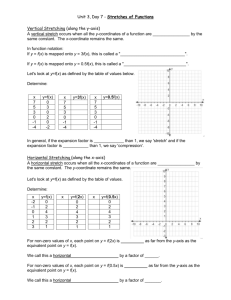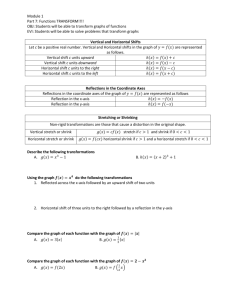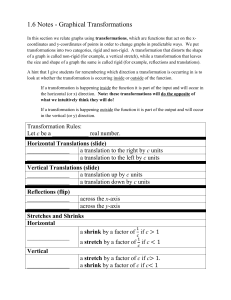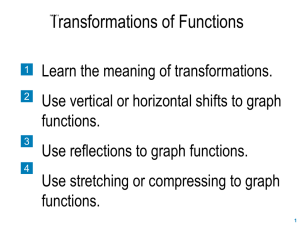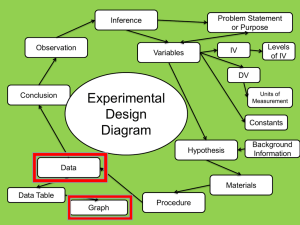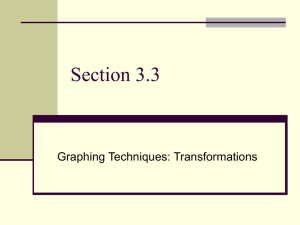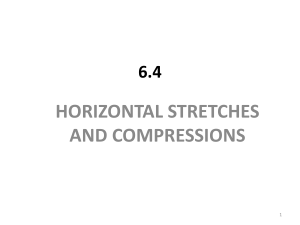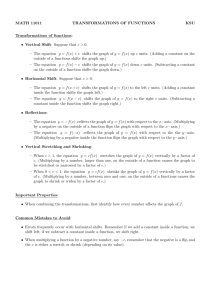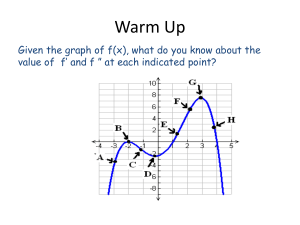Document
advertisement
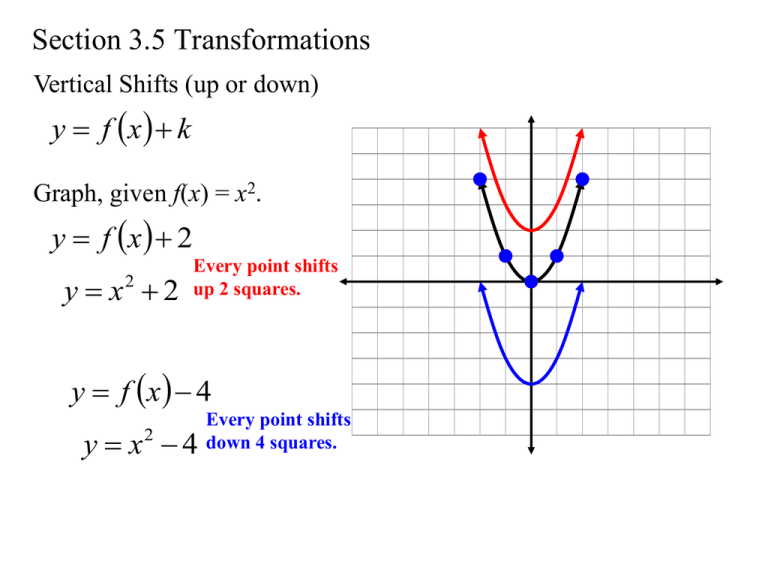
Section 3.5 Transformations Vertical Shifts (up or down) y f x k Graph, given f(x) = x2. y f x 2 y x2 2 Every point shifts up 2 squares. y f x 4 y x2 4 Every point shifts down 4 squares. Section 3.5 Transformations Horizontal Shifts (left or right) y f x h Graph, given f(x) = x2. y f x 2 Every point shifts 2 left 2 squares. y x 2 y f x 4 Every point shifts 2 right 4 squares. y x 4 Section 3.5 Transformations Vertical Stretching and shrinking. y a f x (-2, 8) (2, 8) Graph, given f(x) = x2. y 2 f x y 2x 2 Every y coordinate of each point is multiplied by 2. 1 y f x 2 Every y coordinate 1 2 of each point is y x multiplied by 1/2. 2 (-2, 4) (2, 4) (-1, 2) (-2, 2) (-1, 1) (-1, 1/2) (1,(2, 2) 2) (1, 1) (0, 0) (1, 1/2) Section 3.5 Transformations Horizontal Stretching and shrinking. y f b x Everything is opposite of vertical! Graph, given f(x) = |x|. y f 2 x y 2x Every x coordinate (-2, 4) of each point is (-4, 4) (-3, 3) (-1, 2) divided by 2. (-6, 3) (-4, 2) (-2, 2) 1 y f x 2 Every x coordinate 1 y x 2 (2, 4) (4, 4) (1, 2) (3, 3) (6, 3) (2, 2) (4, 2) (0, 0) of each point is divided by 1/2. Remember we don’t divide by fractions, we multiply by the reciprocal! Section 3.5 Transformations Reflections, flipping over x-axis or y-axis. Graph, given f x x. y f x Every point will flip over the x-axis. y x y f x y x Every point will flip over the y-axis. Transformations have a specific order… The ORDER OF OPERATIONS! 3rd 1st 2nd 4th Outside the function… Inside the function… affects y-coordinates. affects x-coordinates. 1. If a is negative, then flips over x-axis. 1. If b is negative, then flips over y-axis. 2. If | a | is > 1, then Vertical Stretch. If 0 < | a | < 1, then Vertical Shrink. 2. If | b | is > 1, then Horizontal Shrink. If 0 < | b | < 1, then Horizontal Stretch. Inside the function… affects x-coord. Outside the function… affects y-coord. Solve bx – c = 0. The answer for x will tell you which direction (sign) and how far (value). Take the value of d for face value. + d goes up d units; – d goes down d units. 3&4 EXAMPLE. 5. y 2 ( x 5) 3 1. Flips over y-axis. 1. 2. 2. – x + 5 = 0 +5=x Right 5 units. 3. Flips over x-axis. 4. Vertical Stretch by 2. 5. Up 3 units. Consider the function y f x on the graph. Graph y f x 2 3 . 1. x – 2 = 0. x = +2 Right 2 units. 2. Up 3 units Graph y f x 5 . Consider the function y f x on the graph. Graph y f x 2 3 . 1. x – 2 = 0. x = +2 Right 2 units. 2. Up 3 units Graph y f x 5 . 1. negative on the inside flips over the y-axis. 2. – 5 on the outside shifts down 5 units Consider the function y f x on the graph. Graph y 3 f x . 1. Negative on the 3 will flip the graph over the x-axis and | -3 | = 3 and will cause a vertical stretch by multiplying the y-coordinates by 3. 1. A quicker way is to multiply all y-coordinates by -3. (1, 3) (-3, 2) (3, 3) (-1, 1) 1 Graph y f x . 2 (1, -1) (3, -1) (-1, -3) (-3, -6) Consider the function y f x on the graph. Graph y 3 f x . 1. Negative on the 3 will flip the graph over the x-axis and | -3 | = 3 and will cause a vertical stretch by multiplying the y-coordinates by 3. 1. A quicker way is to multiply all y-coordinates by -3. 1 Graph y f x . 2 1. Multiplying ½ to the inside will cause a horizontal stretch. Remember, everything is opposite. Divide all x-coordinates by ½. Again we don’t divide by fractions, instead we multiply by the reciprocal ( times by 2). (1, 3) (-6, 2) (-3, 2) (3, 3) (-1, 1) (-2, 1) (1, -1) (-1, -3) (-3, -6) (3, -1) (2, -1) (6, -1) Consider the function y f x on the graph. Graph y f 2 x . 1. Negative on the 2 will flip the graph over the y-axis and | -2 | = 2 and will cause a horizontal shrink by dividing the x-coordinates by 2. 1. A quicker way is to divide all x-coordinates by -2. (-3, 2) Graph y 2 f x 3 . (-1, 1) (-1.5, -1) (1.5, 2) (0.5, 1) (1, -1) (-0.5, -1) (3, -1) Consider the function y f x on the graph. Graph y f 2 x . (-6, 4) (-4, 2) (-3, 2) (-1, 1) (-6, 2) Graph y 2 f x 3 . 1. The “+3” on the inside of the ( )’s will move every x-coordinate to the left 3 units. 2. The multiplication of 2 on the outside will multiply 2 to every y-coordinate. (-4, 1) (-2, -1) ( 0, -1) (1, -1) (3, -1) (-2, -2) ( 0, -2)
